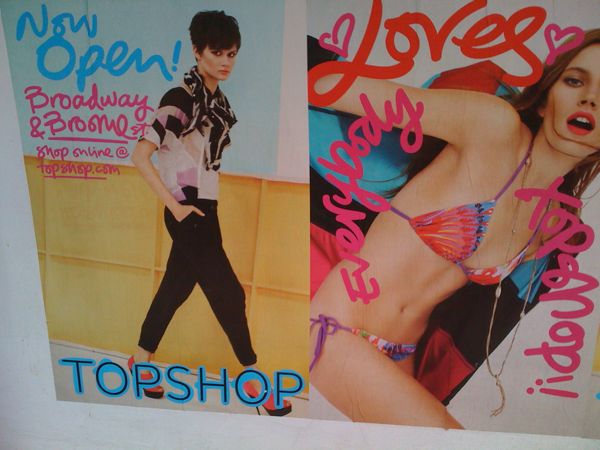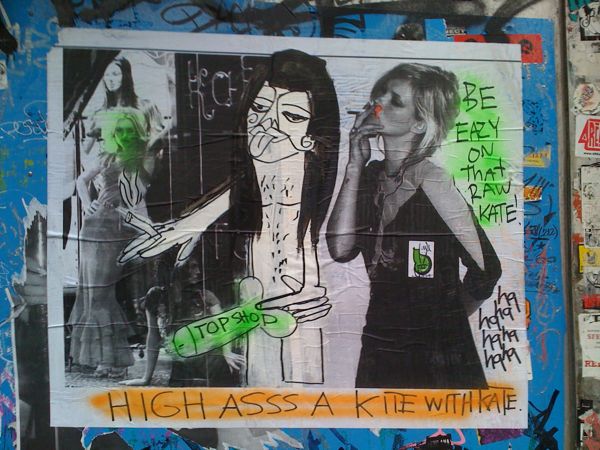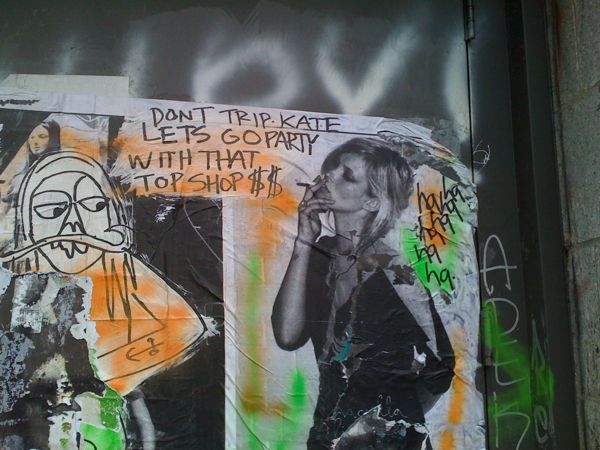
Desedo resident polymath Paul Kamuf has managed, in the midst of our current goings-on, to complete a short starring one of his favorite beverages. Tea. Here’s hoping that the next time we mooch off of him, there will be some more great flavors in the cupboard. Until then, you can find the goodness here.
-
Conventional Thought Tea
that new new green -
Race, Ethnicty & New Media Symposium

westside, talk it out.
MHB will be presenting his American-Muslim Consumer research at the Texas A&M Race and Ethnic Studies Institute conference on April 30th. -
Topshop
 UK fashionista fave TopShop just opened its first NYC store. Wheatpaste adverts abound. And next to some of the official ads, lurk posters that seem to poke fun at spokesmodel Kate Moss and the brand. Yet they are rather harmless and in keeping with both the brand spirit and aesthetic.
UK fashionista fave TopShop just opened its first NYC store. Wheatpaste adverts abound. And next to some of the official ads, lurk posters that seem to poke fun at spokesmodel Kate Moss and the brand. Yet they are rather harmless and in keeping with both the brand spirit and aesthetic.

So it makes me wonder if the snarky posters are in fact from the agency running the campaign. Are they creating their own point/counterpoint in an effort to further place the brand within the streetscape dialogue? Is it an effort to make TopShop look all the more fresh and that people care enough about it to talk it out? And if so, where does this fall within the rules of slang and advertising?

-
Work: NY Ink
Here’s a short doc piece I just did for Format magazine. What you’ll see is a brief look inside the world of the tattoo artist. Three NYC buzzers talk about process, inspiration, and adventures with the needle. We visit inside a popular Harlem parlor, The Black Ink Gallery, and an underground space in Queens.
What you won’t see is the Pit Bull Terrier owned by one of the artists who bit my leg and took away a large strip of denim. It was, probably, one of the best shots I’ve ever framed. Unfortunately, I didn’t press record in time. Here is the dog, appropriately named Perro, about a second and a half before what I affectionately refer to as the incident.

my own personal zapruder film -
A Certain Regard

Yesterday the Times ran an interesting piece about French advertising, noting the cultural (if not legal) norms there prevent such things as the hard sell.
To us money implies corruption, and moreover, because we consider ourselves the inventors of freedom, never mind if that’s not true, we still consider advertising as a kind of manipulation,†Mr. Séguéla said. “This explains why television commercials started so late here  essentially because leftist opposition saw ads as corrupting the soul.â€Â
As a result, the ads there tend to be more oblique, elliptical. All of this begs the question of whether the effectiveness of television advertising can be controlled for cultural norms. But for the aesthetes among us, the question is simple: what do they look like? Though the Times failed to link to relevant spots in a current museum exhibit there, the sleuths at the Alley Insider did. Here’s one:
MKIz-PPoaJo Many moons ago, preparing for a year in Europe, I can remember being warned (or was it teased?) that the commercials there would be much more artistic. I was, in the next few days floored by a Levis ad that, over the years, I would remember mainly in fragments. I have attempted to describe its dreamlike qualities many times, but failed to touch in conversation what the commercial had evoked in my impressionable teen psyche. Mainly, that the coolest place to store a condom was highly concomitant with a pair of Levis (now my only brand of jeans). The commercial, I would learn years later, was directed by frenchman Michel Gondry. Allez les Bleus!
Uj6G1C6c0uw
—
The still above is from another Gondry-directed spot featured here.


